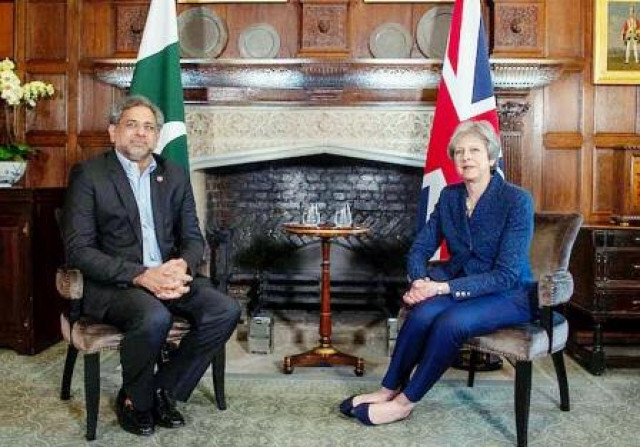PM pushes for extraditing ‘troublemakers’ from UK
Abbasi meets May on CHOGM sidelines

Prime Minister Shahid Khaqan Abbasi in a meeting with British Prime Minister Theresa May in Windsor Castle. APP
The move comes amid renewed efforts on the part of top government functionaries to sign an extradition treaty with Britain to allow the speedy exchange of criminals between Pakistan and the United Kingdom of wanted prisoners.
Though the signing of an extradition treaty with Britain is still a distant possibility, the UK authorities have shown willingness to cooperate on extraditing some ‘troublemakers’ who are working against the interests of Pakistan, according to government officials with knowledge of the matter.
The matter was reportedly discussed during a meeting between PM Abbasi and his British counterpart Theresa May on Friday but an official statement issued after the meeting lacked any mention of the issue.
PM Abbasi stresses need to ensure justice for oppressed
During the meeting held at Windsor Castle on the sidelines of 25th Commonwealth Heads of Government Meeting (CHOGM 2018), the two leaders discussed matters of bilateral and mutual interest.
During his three-day (April 18-20) visit to the UK to attend the Commonwealth Heads of Government Meeting (CHOGM), the prime minister met senior UK government functionaries.
During the deliberations, Abbasi, who was accompanied by Foreign Minister Khawaja Asif, Interior Minister Ahsan Iqbal and other senior government officials, is said to have taken up the issue of extradition of ‘hardened criminals’, particularly members of the militant wings of political parties and those of some banned Bloch outfits who have allegedly been working to sabotage the China-Pakistan Economic Corridor (CPEC).
“Pakistan is concerned that those working against CPEC have the resources to take refuge in developed countries like Britain, Switzerland and Canada.
Such elements are mainly operating in Balochistan, Gilgit-Baltistan and parts of Sindh with the alleged support of some commanders of banned separatist outfits that are working under the direct patronage of intelligence agencies of ‘hostile countries’,” an official privy to the matter said in an obvious reference to secretive agencies of India and Afghanistan.
“There are elements who had been harbouring political violence in Karachi. The motives of such activities are the same — to create instability and discourage conducive environment for foreign investment.”
PM Abbasi discusses elimination of preventable blindness at CHOGM
On March 28, the federal cabinet approved the signing of the extradition treaties with China and Saudi Arabia for the transfer of sentenced or convicted individuals.
Official sources said following the cabinet’s go-ahead, the respective inputs of foreign, defence and law ministries would be incorporated for the signing of bilateral extradition treaties with the two countries.
“It’s a complex and lengthy process,” an official source said.
The source said the extradition treaties will cover heinous crimes like terrorism, treason, espionage, human trafficking and related crimes, in addition to less heinous crimes like fraudulent practices, visa related issues, financial embezzlement, goods’ smuggling and related offences.
“In the past, there have been moves to sign extradition treaties with countries like Britain, Saudi Arabia and China, but the moves have never been materialised due to complexities and hitches surrounding such measures,” the official said.
If signed, the bilateral treaties would allow extradition of convicted or sentenced persons, who would complete their respective jail terms in the country where the related crime(s) were committed, it is learnt.
Prior to that, reports surfaced that Interior Minister Ahsan Iqbal gave a go-ahead to the interior ministry to finalise extradition treaties with the UK, China and other important states situated in the Gulf, the Middle East and the adjoining belt.
However, so far, the cabinet has granted approval for signing the extradition treaties only with China and Saudi Arabia.



















COMMENTS
Comments are moderated and generally will be posted if they are on-topic and not abusive.
For more information, please see our Comments FAQ